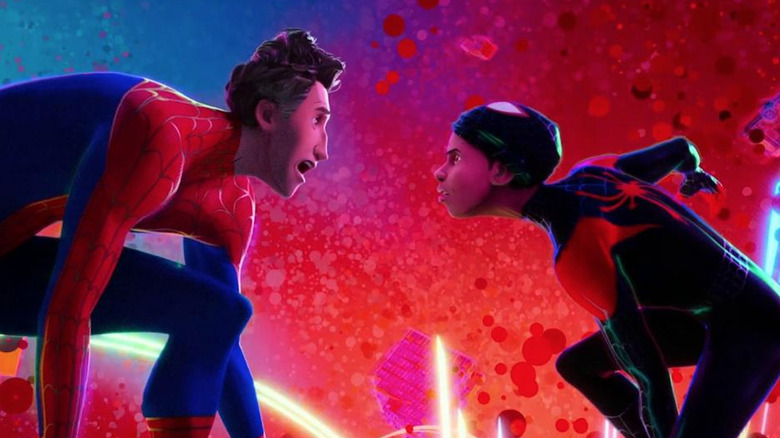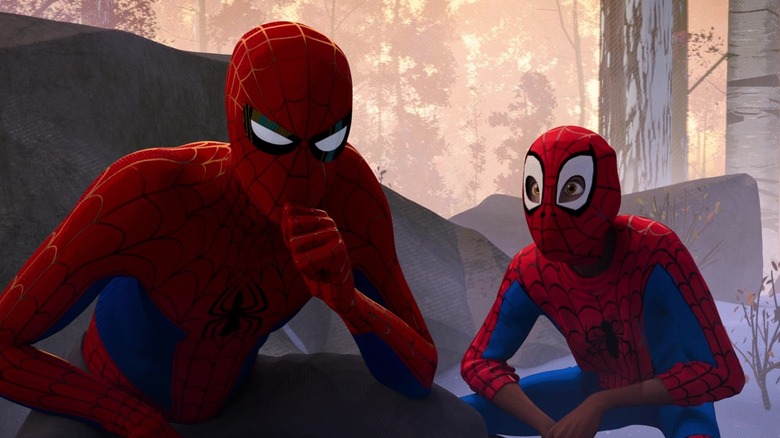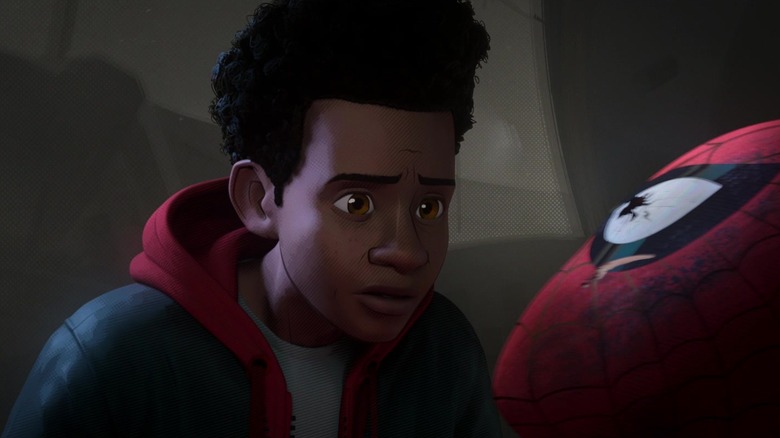Spider-Man: Into The Spider-Verse — The Comics That Set The Foundation For The Movie
Superhero movies have a fair amount of source material to pull from, often with decades worth of comic books and hundreds of adventures laid out before them. Some films are fairly faithful to their source material, such as "Sin City." Others, like "Captain America: Civil War," take liberties to make their storylines more applicable to the big screen or to fit within a larger story. One film that found ways to bring a faithful adaptation to the screen while also being fresh and different is "Spider-Man: Into the Spider-Verse."
While the film shares a concept with writer Dan Slott's "Spider-Verse" storyline, it deviates heavily from the books while also including much of Miles Morales' (Shameik Moore) origin story. Miles' beginnings as Spider-Man in the film are pretty faithful to his start in the original comics, as a mutated spider bites the young boy and gives him the same powers as Spider-Man. There is much about Miles that translates well from the comics to the screen, but the most important element is the death of Peter Parker and how it impacts Miles moving forward.
There are two major moments in comics that seemed to inspire the film's events. "Ultimate Fallout #4: Spider-Man No More" sees Miles take over the mantle of Spider-Man and come to grips with his powers and the responsibilities in the shadow of Peter. And then there's "Ultimate Comics #4: What Would Peter Do?," where Miles actually watches Peter die.
Miles Morales is living in Peter Parker's shadow
Spider-Man casts a big shadow, and that shadow is one that Miles Morales has a hard time stepping out of both in the comics and on the big screen. There are similarities to both storylines, but the comics and the film differ in a few ways.
In the comics, when Miles began wearing the same suit as the recently deceased Peter Parker, there are many people who believe wearing the suit so soon after his death is unjust. After hearing the backlash, Miles begins thinking about it as well and comes to the conclusion that wearing the suit is in poor taste. Miles decides to ditch the suit and has to come up with his own look and his own way of being the new webhead.
In the film, Miles also has to follow in the footsteps of a savvy, beloved Spider-Man whom he has difficulty living up to. His only saving grace is the tutelage of a down-and-out Peter B. Parker (Jake Johnson), a Spider-Man from another dimension who initially seems to be far less inspirational. Of course, that isn't his only help, as he also has a number of other webheads to teach him how to step out of the shadows. Eventually, in both the comics and "Into the Spider-Verse," Miles develops his own suit and steps out of Peter's shadow.
He shared a devastating trauma at the beginning
Sure, both Peter Parker and Miles Morales were bitten by a Spider and became Spider-Man, but one other similarity that they have is that they both watched someone die and were forced to grow as a result of the trauma. While Peter Parker watched Uncle Ben die due to his inaction, Miles Morales watches his predecessor die when he is still too inexperienced to use his powers.
In the comics, Miles sneaks out to help a wounded Spider-Man, only to stumble onto him lying in Aunt May's arms. He watches Peter pass away. He eventually finds Gwen Stacey and learns Peter's true identity. In the film, Miles shows up while Peter (Chris Pine) battles Kingpin (Liev Schreiber) and several other villains, who defeat Peter. Before Kingpin is able to kill him, Parker gives Miles the data to stop the collider that could destroy the city.
While there are plenty of differences between the comics and film, "Ultimate Fallout #14: Spider-Man No More" and "Ultimate Comics #14: What Would Peter Do?" hold two of the most basic and core aspects of Miles' character, and they're both adapted pretty faithfully into the film. While "Into the Spider-Verse" is adapted from a wide range of comic material and isn't adapting any one single storyline, these two comics are clear influences on the animated "Spider-Verse" hit.


